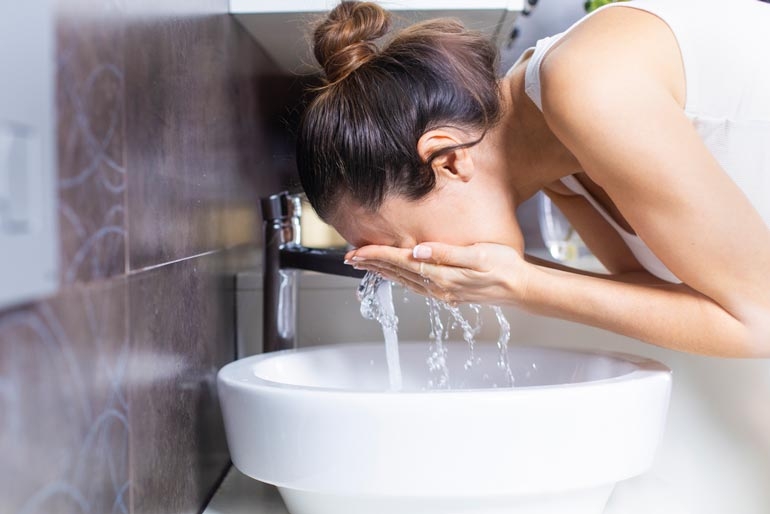Start 14-Day Trial Subscription
*No credit card required

Achieving Acne-Free Skin: The Role of Face Washing in Your Skincare Regimen
Learn the importance of clean skin, how to choose the perfect face wash based on your skin type, and master the proper face washing technique. Find out the ideal frequency for washing your face and transform your skincare routine with informed decisions
You've probably heard it a thousand times: "Wash your face!" But why is this simple act so crucial in your skincare regimen? It's not just about removing dirt and grime. Face washing plays a pivotal role in maintaining healthy, glowing skin.
It's the first step in your skincare routine, setting the stage for the effectiveness of products that follow. More than just a splash of water, the right face washing technique can work wonders. It's a game-changer that can transform your skin health, and here's how.
Understanding the science behind face washing can empower you to make informed skincare decisions. So, let's delve into the role of face washing in your skincare regimen.
Importance of Clean Skin
Maintaining a clean canvas is essential when it comes to your skincare regimen. Let’s decode this further with a few reasons why keeping your skin clean matters so much.
Keeps Skin Clear and Healthy
A clean face represents a barrier against the hazards of the environment. It staves off harmful bacteria, clinging dirt and other pollutants. But there's more to face washing than just a mere cleaning operation. Quality cleansing helps you maintain the balance of natural skin oils – the sebum. This balance is especially significant for those with acne-prone skin, as sebum overproduction often links to acne development. So, by washing your face twice a day with an acne-specific cleanser, you could avoid potential breakouts.
Removes Dirt and Impurities
On a typical day, your face encounters quite a few agents that can harm your skin. Whether it’s the grime you battle on your commute, the dust accumulated at your workspace, or the sweating during an intensive gym workout, the external factors are endless. Remarkably, the layer of your skin is like a magnet to these impurities. Washing your face diligently will remove these impurities and leave your skin refreshed and revitalized.
Helps Prevent Breakouts
Numerous studies link dirt accumulation and breakouts. It’s often seen that people who neglect to wash their face frequently experience more acne or pimples. The reason? Unattended dirt and grime can clog your pores, leading to blackheads, whiteheads and nasty breakouts. To keep breakouts at bay, it's advisable to wash your face before you hit the sack. This practice will clear your pores, allowing your skin to breathe and rejuvenate while you rest. These vital points underscore just how important it is to keep that face of yours squeaky clean.
Choosing the Right Face Wash
Selecting the perfect face wash isn't as easy as picking your favorite color. It's a personal and highly singular decision. Many factors come into play in the quest for the ideal face wash — your skin type, your skin's sensitivity, the presence of acne and the ingredients within the face wash itself. Let's delve deeper into these factors.
Consider Your Skin Type
Your skin is unique, and knowing its character could be your best advantage in your skincare routine. Is your skin oily, dry, or a combination of both? Perhaps it’s sensitive or acne-prone. Whatever it may be, the goal is to select a face wash that complements your skin type.
- For dry skin, look for face washes with moisturizing ingredients, such as glycerin or hyaluronic acid.
- Oily skin benefits from cleansers that control oil production without stripping the skin of its natural oils. Additionally, according to experts at Misumi Skincare, sulfur can be a useful ingredient for those with oily complexions.
- Those with combi-skin can opt for foaming face washes that effectively eliminate oil from the T-zone area while keeping the rest of the face moisturized.
- For sensitive and acne-prone skin, choose face washes that are gentle, hypoallergenic and non-comedogenic.
Look for Gentle and Non-Irritating Formulas
The milder your face wash, the better it is for your skin. A harsh face wash can lead to an unhealthy skin barrier, making your skin vulnerable to bacterial growth, which is a leading cause for acne. Avoid face washes that make your skin feel excessively dry or tight after rinsing since this could indicate that they're stripping your skin of its natural oils.
Avoid Harsh Ingredients
Lastly, the ingredient list on the face wash you pick is important. Steer clear of products that contain alcohol, fragrance or sulfates (like sodium lauryl sulfate). These ingredients can irritate your skin, leading to dryness and inflammation – factors that could trigger further breakouts.
Proper Face Washing Technique
Understanding and implementing the correct face washing technique is as important as selecting the right product. Let's delve into the step-by-step process you need to follow to ensure an effective facial cleanse.
Wet Your Face with Warm Water
Firstly, you'll want to start off by thoroughly wetting your face with warm water. Warm water helps to open up your pores, allowing the face wash to penetrate deeper and cleanse more effectively. This step is particularly useful for those with acne-prone skin as it helps to remove the dirt and oils trapped within your pores.
Apply the Face Wash
Once your face is sufficiently wet, it's time to apply your chosen face wash. However, you should avoid applying your face wash directly onto your face. Instead, pour a coin-sized amount of face wash onto your hand and lather it up by rubbing your palms together before applying it to your face.
Gently Massage in Circles
Next, gently massage the face wash into your skin in small, circular motions. Be extra careful around sensitive areas such as under the eyes and avoid tugging or pulling at your skin. You should continue this massage for at least a minute, concentrating on areas that are prone to oiliness or acne.
Rinse with Lukewarm Water
Finally, rinse off the face wash using lukewarm water. Be patient in this step to ensure that you've completely removed the face wash from your face. Leaving remnants of face wash can lead to irritation and breakouts, especially in those with sensitive or acne-prone skin.
Frequency of Face Washing
Understanding how often to wash your face is a crucial aspect of your skincare regimen. Your skin type, lifestyle and environmental factors hugely dictate this routine. While it's generally recommended twice a day – morning and evening – there are instances where you might need to cleanse more or less frequently. Let's delve deeper into this to clarify the concept for you.
Morning and Evening
“Wake up and Wind Down,” a well-known skincare principle, proposes washing your face once in the morning and once in the evening. Overnight, your skin repairs, renews and secretes oils that you'll want to wash off in the morning to start your day on all things fresh. On the other side, cleansing in the evening is vital to remove any dirt, pollutants and makeup that settled on your skin throughout the day. It readies your skin for the overnight magic that is about to happen. This is a basic routine, suitable for most skin types. If you notice excessive dryness or oiliness, you might need to tweak this routine based on expert advice.
After Sweating or Exercising
Sweaty gym sessions or an outdoor jog can be your skin's enemy if you are not prompt with your face cleaning routine post-sweat. Sweat can clog your pores, and this can lead to breakouts especially if your skin is acne-prone. Washing your face within an hour of any rigorous activity that leads to sweat is usually a good practice. However, make sure you use a gentle, non-stripping face wash to avoid drying out your skin.
Not Too Often, Not Too Rarely
Perfecting the balance is key. Overwashing your face can strip the skin of essential oils, leading to a paradoxical increase in oil production. On the contrary, less frequent washing can allow grime and dead skin cells to accumulate, resulting in blocked pores, dull skin and breakouts. Experts suggest that the twice a day rule generally works for most. However, understanding your skin type, sensitivity and lifestyle is essential.
In essence, the frequency of your face washing should be “just right!” Your skin has a way of communicating its needs – learn to pay heed to those subtle signs and you are already a step ahead in your skincare regimen.



